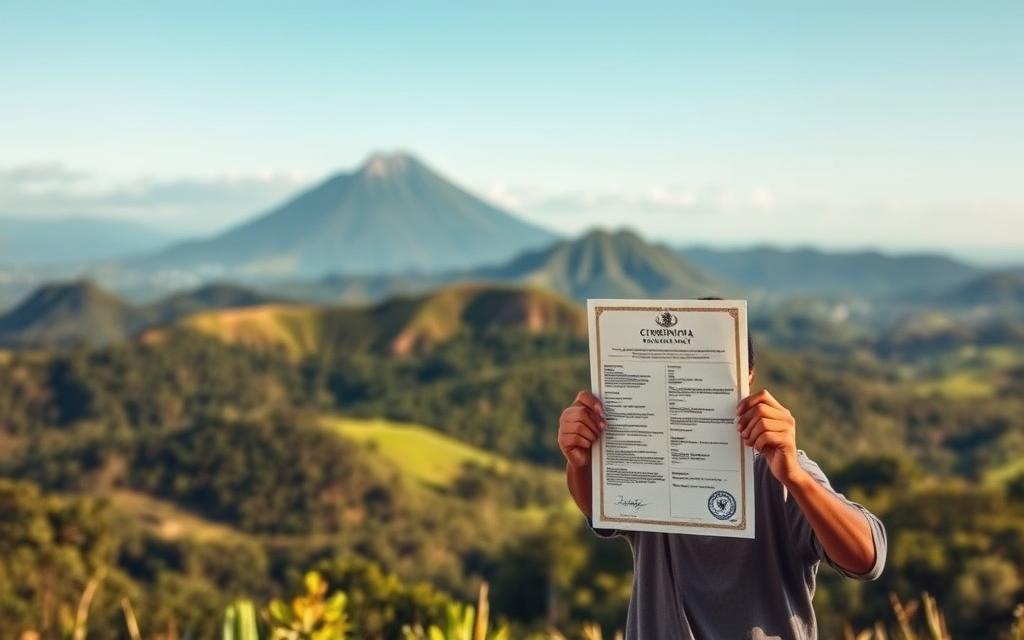Does Costa Rica Residency Affect US Citizenship?

Many individuals and families are drawn to Costa Rica for its high quality of life and diverse opportunities. With over 120,000 foreigners, including many Americans, calling this Central American country home, it's natural to wonder about the implications of residency on US citizenship.
We will examine the relationship between obtaining residency in Costa Rica and maintaining US citizenship, addressing common concerns and misconceptions. Understanding the distinction between residency and citizenship is crucial for Americans considering relocation to this tropical paradise.
By clarifying the legal frameworks that govern dual status, we aim to provide factual information about the rights, obligations, and limitations that come with maintaining US citizenship while establishing residency in Costa Rica.
Understanding Costa Rica Residency and US Citizenship

When considering a move to Costa Rica, US citizens often wonder how residency will affect their citizenship status. Costa Rica offers various residency options, including rentista residency for those with stable income, investment residency for entrepreneurs, and permanent residency for long-term residents.
The Legal Relationship Between Foreign Residency and US Citizenship
The concept of residency is distinct from citizenship. Obtaining Costa Rican residency does not automatically change one's US citizenship status. US citizens can maintain their citizenship while residing abroad, provided they don't take specific actions to renounce it.
Costa Rica's immigration system views foreign residents as individuals who have met specific requirements to live in the country. Americans who become residents are subject to Costa Rican laws and regulations. The US citizenship status remains unaffected, as it is governed by US law.
Common Misconceptions About Dual Status
A common misconception is that establishing residency in another country means surrendering US citizenship. However, US law permits citizens to maintain their citizenship while residing abroad indefinitely. Dual nationality is a concept where a person is a citizen of two countries simultaneously, governed by the laws of each country.
For instance, a child born in Costa Rica to US citizen parents may be both a US citizen and a Costa Rican citizen. Understanding the distinction between residency and citizenship is crucial for US citizens considering a move to Costa Rica.
Does Costa Rica Residency Affect US Citizenship?

Many US citizens considering residency in Costa Rica wonder if it will impact their US citizenship. The good news is that obtaining Costa Rican residency does not affect US citizenship status. US citizens can maintain their citizenship while living abroad, provided they comply with certain requirements.
Legal Framework for US Citizens Living Abroad
The US law establishes a legal framework for citizens living abroad, outlining their rights and responsibilities. US citizens residing in Costa Rica are still subject to US tax laws and are required to file tax returns with the IRS. For more information on dual citizenship laws in Costa Rica, you can visit this guide.
It's essential to understand that certain actions, such as formal renunciation or acts of treason, can potentially jeopardize US citizenship. However, simply obtaining foreign residency is not among these actions.
US Citizenship Retention While Living in Costa Rica
US citizens can retain their citizenship indefinitely while living in Costa Rica. To do so, they should ensure they renew their US passport as needed and stay informed about consular services available to them. Maintaining compliance with US tax filing requirements is also crucial, regardless of residency status abroad.
By understanding the legal framework and their responsibilities, US citizens can enjoy their life in Costa Rica without worrying about their citizenship status. They can take advantage of the country's beautiful landscapes and culture while maintaining their US citizenship.
Costa Rica Residency Options for US Citizens

For US citizens considering a move to Costa Rica, there are several residency options available, each with its unique requirements and benefits. Costa Rica offers a variety of residency programs designed to attract foreign investment and talent, making it an attractive destination for US citizens looking to relocate.
Temporary Residency Categories
Costa Rica provides several temporary residency categories that cater to different needs and circumstances. The Pensionado program is designed for retirees, requiring proof of a minimum monthly pension income of $1,000 from a qualifying source. The Rentista program is another option, suitable for individuals with stable passive income, who must demonstrate a monthly income of $2,500 for at least two years or have a $60,000 deposit in a Costa Rican bank.
The Inversionista program is ideal for investors, requiring a minimum investment of $150,000 in real estate, business, or government-approved projects. This investment must be properly documented and registered in the applicant's name, contributing to the country's economic development.
Permanent Residency Pathways
After maintaining temporary residency status for a specified period, typically three years, US citizens can apply for permanent residency. This pathway offers the advantage of living indefinitely in Costa Rica, provided that the individual continues to meet the established requirements. Permanent residency is particularly appealing to those who wish to fully integrate into Costa Rican society and enjoy the benefits of long-term residence.
The requirements for permanent residency include demonstrating continued income or investment, depending on the initial temporary residency category. Family members included in the initial application can also be part of the permanent residency status, ensuring family unity.
The Residency Application Process in Costa Rica

To live in Costa Rica long-term, US citizens need to apply for residency, which involves gathering specific documents and following a set process. The Costa Rican government has established clear requirements for residency applicants, including registration with the U.S. Embassy, known as consular inscription.
Required Documentation for US Citizens
US citizens applying for residency in Costa Rica must provide several key documents. These include a valid passport, birth certificate, police background check, and proof of income or investment. For US documents to be accepted, they must be apostilled and translated into Spanish. Marriage certificates are also required if applicable. Ensuring that all documents are properly prepared is crucial for a smooth application process.
Timeline and Procedural Steps
The residency application process in Costa Rica typically takes 6-12 months, depending on the category of residency and the current administrative backlog. After submitting the application, applicants receive a provisional residency card. They are also required to attend a biometric appointment as part of the process. Working with an immigration attorney or consultant can help navigate these steps efficiently. To apply for residency, US citizens must first register their presence in Costa Rica with the U.S. Embassy using the Smart Traveler Enrollment Program (STEP) and schedule an appointment for notarial services.
Property Ownership and Residency in Costa Rica

Costa Rica's property laws are generally favorable to foreigners, but the connection between property ownership and residency is more complex than many assume. While Costa Rica encourages foreign investment, the path to legal residency isn't as automatic as many hope.
Investment and Residency Status
Owning a home or land in Costa Rica doesn't directly translate into residency status, but it can open doors if you know how the system works. Notably, property investment can qualify for the Inversionista residency category if it meets the minimum threshold of $150,000. US citizens enjoy almost identical property ownership rights as Costa Rican citizens, with the country's legal system permitting foreigners to own property outright under "Fee Simple" ownership.
This form of ownership is the strongest, allowing you to freely buy, sell, lease, or inherit property without needing a Costa Rican partner or residency status. For more information on the residency process, you can visit this resource.
Legal Considerations for US Property Owners
US citizens purchasing property in Costa Rica must be aware of the legal considerations, including the importance of proper title searches and working with qualified attorneys. Special regulations govern coastal properties in the Maritime Zone, including restrictions on the first 200 meters from high tide.
Understanding these regulations and ensuring that property ownership is structured to maximize residency qualification potential is crucial. By doing so, US citizens can make informed decisions about their investment and potential residency in Costa Rica.
Tax Implications for US Citizens with Costa Rican Residency
The decision to obtain Costa Rican residency as a US citizen comes with significant tax implications that need careful consideration. As a US citizen living abroad, you're still required to file US tax returns, regardless of your foreign residency status.
US Tax Obligations While Living Abroad
US citizens residing in Costa Rica must continue to report their worldwide income to the IRS. However, there are provisions that can help mitigate double taxation. The Foreign Earned Income Exclusion (FEIE) allows qualifying individuals to exclude a certain amount of foreign-earned income from US taxation. Additionally, the Foreign Tax Credit can be claimed for taxes paid to Costa Rica on income that's also subject to US tax. For more detailed guidance on navigating these tax obligations, you can refer to resources like the guide on pensionado visa application, which may provide insights into the residency process and its tax implications.
Costa Rican Tax Considerations
Costa Rica operates a territorial tax system, meaning it only taxes income generated within the country, not worldwide income. This can be beneficial for US citizens with income sources outside of Costa Rica. The country has a relatively low property tax rate of 0.25% of the registered property value annually. However, luxury properties may be subject to additional taxes. It's also important to consider the tax implications of rental income generated from Costa Rican properties, which must be reported to both the US and Costa Rican tax authorities.
To maintain compliance and avoid penalties, US citizens with Costa Rican residency must understand and adhere to the tax laws of both countries. This includes filing the necessary reports, such as the FBAR (Foreign Bank Account Report) for US tax purposes if they have financial accounts in Costa Rica.
Practical Aspects of Living in Costa Rica as a US Citizen
As US citizens consider making Costa Rica their home, understanding the practical aspects of living in this vibrant country becomes essential. From healthcare and banking to driving and daily life, there are several key considerations to ensure a smooth transition.
Healthcare Access and Insurance
US citizens with Costa Rican residency can access the public healthcare system by enrolling in the Caja Costarricense de Seguro Social (CCSS). For those who prefer private healthcare, international insurance options are available. Understanding the differences between these systems is crucial for making informed decisions about healthcare.
Banking and Financial Considerations
Opening a bank account in Costa Rica is a straightforward process once residency is established. US citizens will need to provide identification and proof of residency. Costa Rica's banking system is robust, offering a range of services for individuals and businesses.
Driver's Licenses and Vehicle Ownership
For long-term residents, obtaining a Costa Rican driver's license is necessary. This involves a medical exam, a driving test, and other requirements. Vehicle owners must also comply with emissions testing regulations. For those who prefer not to import a vehicle, purchasing locally is a viable option.
For more information on the process of obtaining residency and its implications, including dual citizenship, visit https://www.jaroscr.com/costa-rica-dual-citizenship-usa/. Daily life in Costa Rica also involves setting up utility services, internet connectivity, and mobile phone options, all of which require formal residency status.
Maintaining US Citizenship While Living in Costa Rica
For US citizens residing in Costa Rica, preserving their citizenship status is both a right and a responsibility. As they enjoy the benefits of living in this vibrant country, they must also stay connected to their US roots.
Consular Services and STEP Registration
The US Embassy in San José offers various consular services to US citizens, including passport renewals, notarial services, and emergency assistance. To stay informed and receive help when needed, registering with the Smart Traveler Enrollment Program (STEP) is crucial. STEP is a free service that allows the Department of State to assist US citizens in emergencies, such as lost or stolen passports. By enrolling in STEP, US citizens in Costa Rica can receive important safety and security updates about the country.
Voting and Other Citizenship Rights
US citizens living in Costa Rica can continue to participate in US elections by casting absentee ballots. They can also report births abroad and obtain Consular Reports of Birth Abroad (CRBA) for their children. Moreover, they can maintain their Social Security benefits by setting up direct deposit and fulfilling proof-of-life requirements. By staying engaged with US institutions, US citizens in Costa Rica can fulfill their citizenship obligations while enjoying their life abroad.
Conclusion
As we conclude our exploration of Costa Rican residency and its impact on US citizenship, it's clear that informed decision-making is crucial. US citizens can maintain their citizenship while residing in Costa Rica, provided they understand and comply with both countries' legal requirements.
Establishing legal residency in Costa Rica offers numerous benefits, including access to local services and a more stable living situation, compared to relying on tourist visa renewals. However, it's essential to remember that tax obligations to the US government continue regardless of residency status.
For US citizens considering the move, we recommend consulting with immigration attorneys and financial advisors to ensure a smooth transition. For professional assistance with the residency process, you can contact Jaros CR at www.jaroscr.com, info@jaroscr.com, or +(506)7182-8969. Thousands of Americans have successfully balanced Costa Rican residency with US citizenship, and with the right guidance, you can too.


